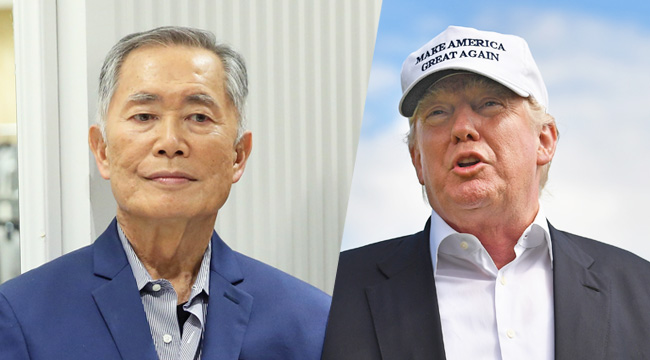
Earlier this week, Donald Trump surrogate Carl Higbie dug a hole while citing the president-elect’s proposal for a Muslim registry as having “precedent” in the Japanese internment camps of WWII. This caused Megyn Kelly’s jaw to drop, although she retained her usual poise while the rest of cable news and the Internet recoiled in horror.
Star Trek actor George Takei has penned an op-ed in the Washington Post to reveal how Bigbie’s words have “reopened very old and very deep wounds.” As a child, Takei spent three years in a California internment camp along with his family. He worries that America is about to rewrite a terrible chapter in history, all based upon how people “happen to look like” those who have committed heinous acts. He’s referring, of course, to how the internment camps functioned as a sort of punishment by association after the Japanese bombed Pearl Harbor. Takei poured his experiences into the piece:
I was just a child of 5 when we were forced at gunpoint from our home and sent first to live in a horse stable at a local race track, a family of five crammed into a single smelly stall. It was a devastating blow to my parents, who had worked so hard to buy a house and raise a family in Los Angeles. After several weeks, they sent us much farther away, 1,000 miles to the east by rail car, the blinds of our train cars pulled for our own protection, they said. We disembarked in the fetid swamps of Arkansas at the Rohwer Relocation Center. Really, it was a prison: Armed guards looked down upon us from sentry towers; their guns pointed inward at us; searchlights lit pathways at night. We understood. We were not to leave.
His narration pushes through various indignities and then makes the argument that “national security” should never be used as a justification to violate constitutional protections. Takei believes that to do so would make America no better than the offenders they seek to punish. He continues:
Let us also agree that ethnic or religious discrimination cannot be justified by calls for greater security. During World War II, the government argued that military authorities could not distinguish between alleged enemy elements and peaceful, patriotic Japanese Americans. It concluded, therefore, that all those of Japanese descent, including American citizens, should be presumed guilty and held without charge, trial or legal recourse, in many cases for years. The very same arguments echo today, on the assumption that a handful of presumed radical elements within the Muslim community necessitates draconian measures against the whole, all in the name of national security.
In 1988, Ronald Reagan formally apologized for the internment of Japanese families with the Civil Liberties Act. The camps were declared to be a terrible civil liberties abuse — one of the worst in American history — and those who have criticized Bigbie’s words believe history could soon repeat itself.
Takei believes that the casual mention by Bigbie of the “precedent” that exists for internment camps will act as a slippery slope, and that America must remain vigilant and not allow Trump or his appointees to enact their proposed policies, which do indeed contain a Muslim registry. The entire column presents a pretty watertight argument and an important one as Trump’s administration begins to take shape.
(Via Washington Post)
